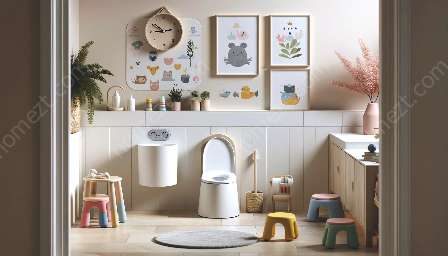If you’re a parent or caregiver, you may have experienced the joys and challenges of potty training. While this developmental milestone is a significant step for toddlers, it can come with its fair share of problems. Understanding common potty training issues and how to address them can help make the process smoother and more successful. Here, we explore several common potty training problems and provide practical tips and solutions to overcome them.
1. Resistance to Using the Potty
Many children experience resistance to using the potty, often due to fear, anxiety, or a preference for the familiarity of diapers. To address this issue, it's essential to create a positive and encouraging environment. Start by talking to your child about the benefits of using the potty and reassure them that it's a natural part of growing up. Introduce fun and interactive potty training tools, such as colorful potty chairs or books that promote potty training. Praise and reward your child for their efforts, and be patient and supportive as they gradually transition to using the potty.
2. Accidents and Setbacks
Accidents are a common part of the potty training journey. It's essential to handle accidents with understanding and patience, refraining from expressing frustration or disappointment. Accidents are a natural part of the learning process, and providing a supportive and non-judgmental response will help your child feel more at ease. Offer gentle reminders and encourage regular potty breaks, especially after meals or before bedtime. It's also helpful to dress your child in easy-to-remove clothing to facilitate quick trips to the potty.
3. Inconsistency in Potty Training Approach
Consistency is crucial for successful potty training. Inconsistencies in the approach, such as using diapers at certain times or switching between different potty training methods, can confuse children and delay progress. Establish a consistent potty training routine at home, daycare, and other caregiving environments. Communicate with caregivers and ensure they follow the same approach to maintain consistency. Consistency helps children feel secure and confident in their potty training journey.
4. Nighttime Potty Training Challenges
Nighttime potty training can present unique challenges, as some children may take longer to achieve nighttime dryness than daytime continence. Be patient and understanding as your child navigates this process. Limiting drinks before bedtime and implementing a consistent bedtime routine can help reduce nighttime accidents. Additionally, consider using protective mattress covers and providing nightlights to make nighttime potty trips easier and less intimidating for your child.
5. Reluctance to Use Public Restrooms
Many children exhibit reluctance to use public restrooms, often due to unfamiliar surroundings or an aversion to loud sounds. To address this issue, expose your child to public restrooms in a gradual and supportive manner. Encourage them to use public facilities during off-peak hours to minimize crowds and noise. Offer reassurance and praise for their efforts, and consider carrying portable potty training aids, such as disposable seat covers or travel-friendly potty seats, to make public restroom experiences more comfortable for your child.
6. Emotional Stress and Pressure
Potty training can be an emotionally charged experience for both children and parents. It's important to approach potty training with patience, empathy, and a positive attitude. Avoid placing undue pressure on your child or setting strict timelines for achieving potty training success. Instead, celebrate small victories and offer support during challenges. Create a supportive and nurturing environment that fosters a healthy attitude towards potty training, promoting a positive and stress-free experience for your child.
7. Regression in Potty Training
It's common for children to experience periods of regression in their potty training journey, particularly during times of stress, illness, or major life changes. Recognize that regression is a normal part of the process and refrain from expressing frustration or disappointment. Offer reassurance and support, and maintain consistency in your approach. Gentle reminders, encouragement, and a patient attitude can help your child regain their confidence and progress through any setbacks.
In Conclusion
Potty training is a significant milestone in a child's development, and it's natural to encounter challenges along the way. By understanding common potty training problems and implementing thoughtful strategies to address them, parents and caregivers can help their children navigate this important transition with confidence and success. With patience, empathy, and a positive approach, potty training can become a rewarding and empowering experience for both children and parents.


